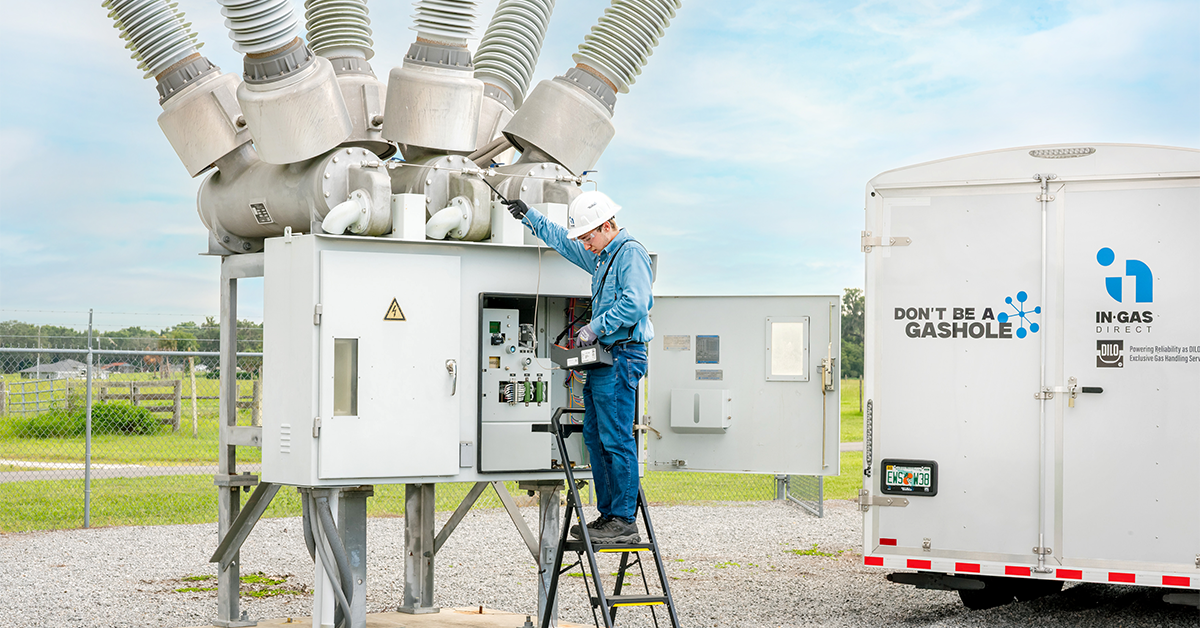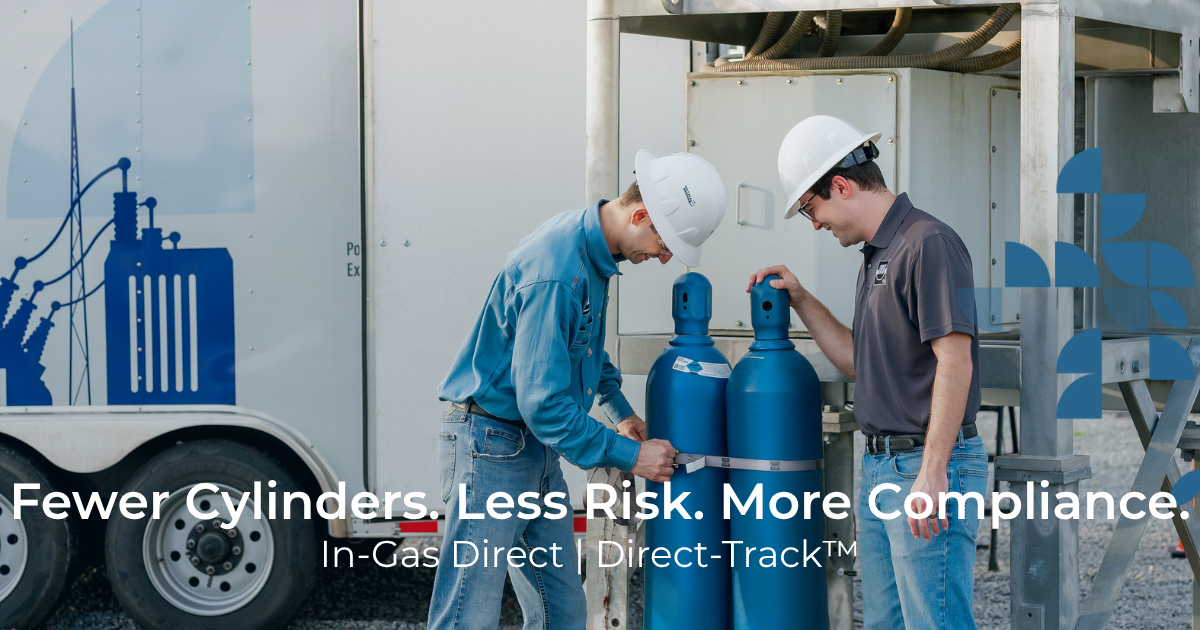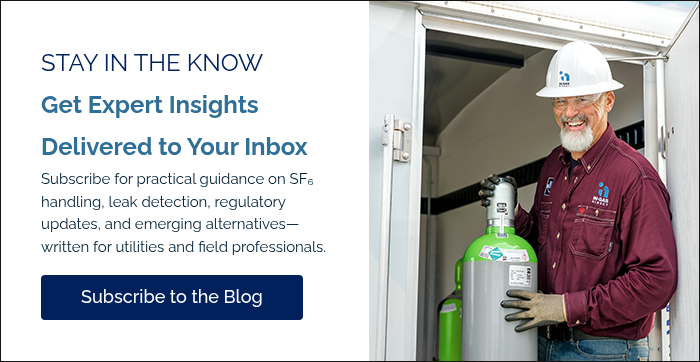When hiring a contractor for SF₆ (sulfur hexafluoride) services, businesses must exercise caution and due diligence. SF₆ is a potent greenhouse gas that is widely used in electrical equipment like circuit breakers and gas-insulated switchgear (GIS), but due to its high global warming potential (GWP), improper handling or disposal can have significant environmental consequences.
Moreover, stringent regulations require businesses to comply with safety, environmental, and reporting standards. In this guide, we will outline the key questions to ask when hiring an SF₆ contractor to ensure you choose the right provider for the job.
1. Experience and Expertise
SF₆ services involve technical expertise, regulatory compliance, and environmental awareness. A contractor’s experience and expertise will significantly impact the quality and safety of their work.
How long have you been providing SF₆ services?
The length of time a contractor has been in the industry speaks volumes about their experience. A seasoned provider will have encountered a variety of scenarios and developed the skills to manage diverse SF₆ handling requirements.
What types of SF₆ projects have you handled (e.g., circuit breakers, GIS, leak detection, gas recovery)?
SF₆ service requirements vary across industries. Ask about their experience working on specific types of equipment such as breakers, gas-insulated switchgear (GIS), SF₆ gas recovery systems, and leak detection technologies. This will help you gauge whether they have experience with the particular needs of your project.
Are your technicians certified for SF₆ handling? What trainings do your technicians receive for SF₆ gas handling?
Certified technicians are essential for ensuring that all SF₆ work is performed safely and in full compliance with industry regulations. Ongoing training in best practices and SF₆ safety protocols is critical. At Direct, all technicians are DILO certified and participate in continuous education, keeping them current with the latest handling methods and regulatory updates.
2. Compliance and Safety
SF₆ handling is governed by strict regulations due to its environmental impact. Ensuring your contractor adheres to these regulations is paramount for legal compliance and environmental sustainability.
How do you ensure alignment with EPA regulations and international standards such as the GHG Protocol Standards?
Contractors should be well-versed in federal and international regulations governing SF₆. The EPA, for example, has set stringent guidelines for SF₆ emissions, and your contractor should be able to demonstrate their adherence to these standards.
Can you provide documentation showing a clean environmental compliance history?
Request proof of past compliance, such as records of past projects that met EPA regulations or were completed without incident. This ensures that the contractor operates within the law and doesn’t expose your company to environmental liabilities.
What safety protocols do you follow for SF₆ gas recovery, filling, and leak repairs?
Safety is a key concern when working with potentially hazardous materials like SF₆. Ask about their standard operating procedures for handling SF₆, including protective measures during recovery, filling, and leak repairs to minimize risks to personnel and the environment.
In 2020, the EPA’s Greenhouse Gas Reporting Program collected data from approximately 8,000 facilities, accounting for almost 50% of total U.S. GHG emissions. Ensuring your contractor follows these standards helps your company stay in compliance.

3. Equipment and Technology
The technology and equipment used in SF₆ handling are crucial for ensuring safety and efficiency. Using outdated or improperly calibrated equipment can lead to hazardous leaks, inaccurate measurements, and environmental damage.
What specific equipment do you use for SF₆ gas handling, testing, and recycling?
Ask about the exact tools and machines the contractor uses for SF₆ recovery, leak detection, testing, and recycling. Equipment that complies with emission-free standards is a must, especially in light of the potential environmental impact. Using cutting-edge equipment ensures a higher level of precision and safety.
Is your equipment calibrated regularly and certified for emission-free operation?
Regular calibration ensures that the equipment performs optimally and within regulatory requirements. Certified equipment means it meets international standards for accuracy, safety, and environmental protection.
Ensure the contractor uses DILO SF₆ gas handling equipment. These are high-quality, emission-free systems designed for maximum efficiency in managing SF₆.
4. Handling and Disposal Practices
Proper handling and disposal practices not only prevent SF₆ emissions but also ensure compliance with environmental regulations, such as those set by the EPA and international agencies.
What’s your process for SF₆ recovery and recycling?
SF₆ recovery and recycling must follow stringent procedures to reduce emissions. Ask the contractor to describe their recovery methods and whether they have a process for recycling or reconditioning contaminated SF₆ gas.
How do you track SF₆ usage and emissions?
A qualified contractor should use transparent, standardized reporting methods aligned with industry-recognized frameworks such as those developed by IEEE. This ensures your emissions data can be seamlessly integrated into corporate sustainability reports or end of the year reporting.
Can you provide certificates of recycling or destruction?
After handling SF₆, contractors should be able to supply certificates showing that the gas was recycled or destroyed responsibly, ensuring compliance with environmental standards.
Are you capable of generating end-of-year reports for EPA submission?
Contractors handling SF₆ should be able to provide complete documentation for regulatory reporting to agencies such as the EPA, CARB, or MassDEP when applicable. These reports are essential for businesses to verify compliance with SF₆ regulations and avoid potential penalties.
5. Insurance and Liability
Handling hazardous gases like SF₆ comes with inherent risks. It’s essential that your contractor carries the appropriate insurance to cover any incidents.
Do you carry liability insurance tailored to hazardous gas handling?
SF₆ handling involves potential risks, and it’s important that the contractor has professional liability insurance to cover any incidents that might occur, from accidental emissions to equipment failures.
What’s your response protocol in the event of accidental SF₆ release?
Ask about their emergency response plan in case of accidental SF₆ emissions or leaks. Ensure the contractor has a well-defined procedure for mitigating the impact of such incidents on both human health and the environment.
6. Cost and Contracts
Transparency in pricing is crucial for avoiding hidden costs or miscommunications.
Can you provide a detailed estimate (mobilization, recovery, analysis, disposal)?
Make sure you receive a comprehensive quote that includes all expected costs. This should cover mobilization, SF₆ recovery, analysis, and disposal of the gas, along with any additional fees for equipment or travel.
How are unexpected site conditions or change orders handled?
Construction and equipment-related projects often face unexpected conditions. Clarify how the contractor handles changes to the initial agreement, including any potential extra costs for unforeseen issues like additional site assessments or emergency leak repairs.
7. References and Reputation
A reputable contractor will have positive reviews and a history of successful SF₆ projects.
Can you share references from utility or industrial clients?
Ask for references or case studies from previous clients in the power utility or industrial sector. A strong reputation with other businesses in your industry is a good indicator that they can handle the unique demands of SF₆ services.
Have you ever faced environmental violations or lawsuits related to SF₆ work?
A contractor’s legal and environmental history will help you assess their risk level. Be sure to ask if they have faced any violations or lawsuits related to SF₆ or other hazardous materials.
8. Emergency Response
SF₆ leaks or failures can be time-sensitive. It’s critical to know your contractor’s ability to respond quickly.
Do you offer emergency callout services for SF₆-related incidents?
Ask if the contractor offers emergency services in the event of SF₆ leaks, gas recovery issues, or failures. Their ability to respond quickly to emergencies can help mitigate risks to both personnel and the environment.
What is your typical response time in an emergency?
Make sure the contractor provides an estimated response time in case of urgent SF₆-related issues. Time is critical when addressing leaks or recovery issues, and the quicker they act, the better.
9. Training and Continuous Improvement
Regulations and technologies in SF₆ handling evolve over time. A contractor who invests in continuous training is more likely to stay compliant and deliver top-quality service.
How do you stay current on SF₆ legislation and best practices?
SF₆ regulations and best practices are constantly changing. Contractors should demonstrate a commitment to ongoing learning to ensure they comply with the latest industry standards.
Do you invest in ongoing SF₆ training for your team?
Ensure that the contractor provides regular training for their technicians. Continuous education ensures their staff can handle new challenges and technologies related to SF₆ safely and efficiently.
10. Added Value
Consider whether the contractor offers additional services that could benefit your business.
Can you advise on alternatives to SF₆, such as C4 gas?
Ask if the contractor can provide consultation on alternative gases to SF₆. Some companies are exploring alternatives that may be less harmful to the environment and still effective for electrical equipment.
Do you offer inventory tracking and reporting support for compliance programs like GHG Protocol Standards?
Contractors who provide tools and support for inventory tracking and greenhouse gas (GHG) reporting can be invaluable partners in ensuring your organization remains compliant with national and international environmental regulations. Adherence to frameworks such as the GHG Protocol Standards — the world’s most widely used greenhouse gas accounting system — helps standardize emissions reporting and enhances credibility with regulators and stakeholders.
Why Direct Is the Right Choice for SF₆ Services
At In-Gas Direct, we understand the importance of precise, compliant, and efficient SF₆ services. With certified, experienced technicians, advanced SF₆ equipment maintenance, and a commitment to environmental stewardship, we offer solutions that meet all your SF₆ handling needs.
Regardless of whether you need SF₆ recovery, SF₆ gas handling, or SF₆ training, our team is dedicated to providing you with top-tier services that ensure safety, compliance, and quality.
Ready to Hire the Right SF₆ Contractor?
When it comes to SF₆ gas handling, you can’t afford to take chances. In-Gas Direct offers industry-leading SF₆ services backed by decades of experience, certified technicians, and the most advanced emission-free equipment on the market. From gas recovery and leak detection to regulatory reporting and emergency response—we’ve got you covered.
- Fully compliant with CARB, EPA, and international standards
- DILO-certified technicians trained in the latest handling techniques
- Comprehensive SF₆ service packages tailored to your needs
Don’t be a Gashole—trust the experts in SF₆.

Lina Encinias
Lina Encinias holds a B.S. in Environmental Science with a minor in Mass Communications from the University of South Florida. Since joining DILO in 2017, she has combined her technical knowledge with her communication skills to support utilities and industries in safe, compliant, and sustainable gas management. Passionate about environmental stewardship, Lina is dedicated to advancing best practices that protect both people and the planet.
Related Articles

Market Outlook 2026-2032: Will SF₆ Prices Rise as Regulations Tighten?
February 3, 2026

Complete Guide to SF₆ Gas Leak Detection Methods
January 7, 2026

SF₆ Cylinder Consolidation: Cut Costs and Emissions
November 4, 2025
.png) September 15, 2025
September 15, 2025
.png) Lina Encinias
Lina Encinias
.png)
